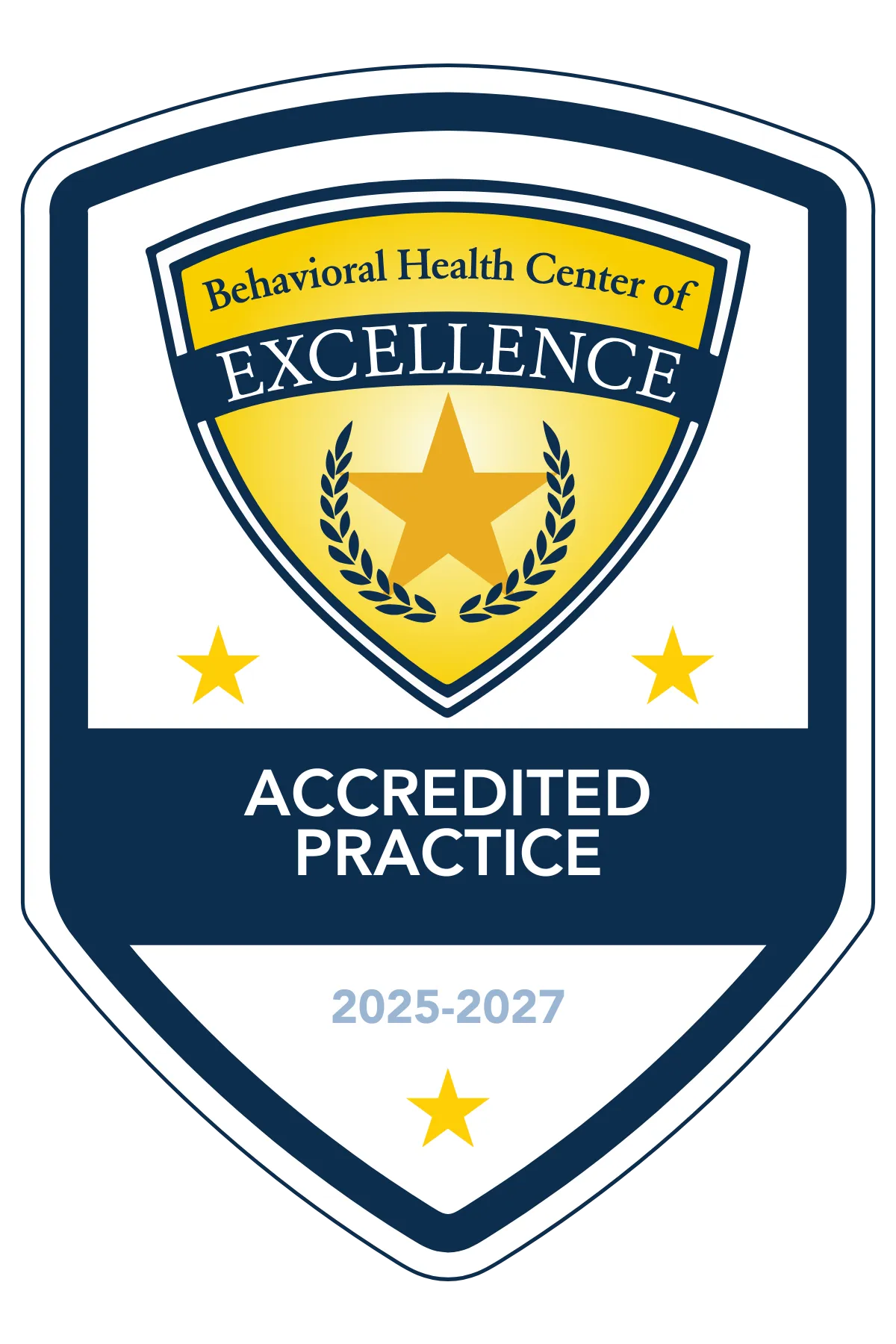Understanding the Critical Role of Parent Training in ABA Therapy
Parent training in Applied Behavior Analysis (ABA) therapy is a foundational element that enhances treatment effectiveness, supports long-term developmental gains, and fosters stronger family relationships. This article explores the multifaceted benefits of parent training, detailing how active parental involvement transforms therapy outcomes for children with autism spectrum disorder (ASD) and other developmental challenges.
Why Parent Training is Essential in ABA Therapy
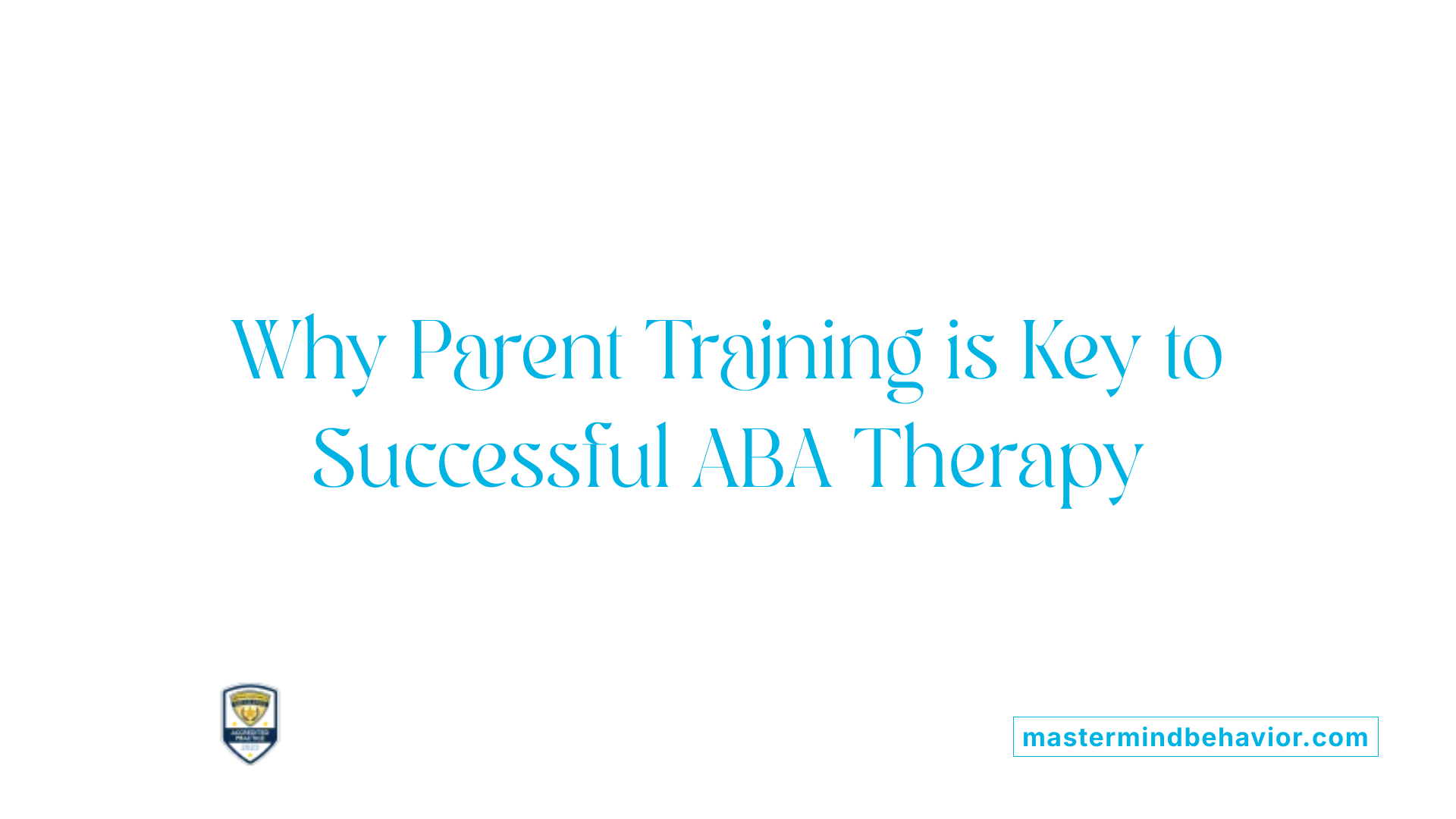
Why is parent training important in ABA?
Parent training plays a vital role in the success of ABA therapy for children with autism spectrum disorder (ASD) or developmental challenges. It empowers parents to become active participants in their child's treatment, ensuring that therapeutic techniques are consistently applied at home and in other settings.
When parents learn fundamental ABA strategies such as positive reinforcement, prompting, and modeling, it facilitates the generalization of skills learned during therapy. This means children can transfer behaviors across different environments, which is crucial for long-term progress.
Addressing common barriers like parental stress, cultural differences, or lack of confidence is also a significant part of effective parent training. Customized support helps families overcome these challenges and adopt strategies that fit their unique circumstances.
Research shows that involving parents in therapy enhances developmental gains, prevents regression of skills, and accelerates progress. Overall, parent training fosters a collaborative and supportive environment, which not only boosts children's growth but also strengthens family bonds.
How does training reinforce strategies across environments?
Ensuring consistency in applying ABA strategies at home, school, and community settings is essential. Parent training teaches caregivers to utilize visual schedules, positive reinforcement, and calm responses to challenging behaviors, promoting a uniform approach.
When parents practice these techniques regularly, children experience a seamless transfer of skills. This consistency makes behaviors more durable and accessible in everyday situations, leading to better social, communication, and independence outcomes.
What are some barriers to effective participation?
Many families face obstacles such as high stress levels, limited time, cultural differences, or lack of understanding about ABA. Recognizing these barriers allows providers to tailor training approaches, offer ongoing support, and include practical resources.
Building a trusting relationship between parents and therapists encourages open communication. Addressing these barriers ensures that parent training is accessible, feasible, and meaningful for every family.
How does parent training support long-term progress and skill retention?
One of the main goals of parent training is to sustain gains made during therapy. Parents learn to reinforce and practice skills daily, which helps maintain progress and prevents regression.
Furthermore, ongoing coaching and support enable families to adapt strategies over time, ensuring that skills remain integrated into daily routines. This continuous reinforcement fosters independence and long-term development, even after formal therapy concludes.
| Aspect | Impact | Explanation |
|---|---|---|
| Skill generalization | High | Ensures skills are used across settings and situations. |
| Family involvement | Increased | Strengthens consistency and supports child progress. |
| Barriers addressed | More effective participation | Customized strategies overcome individual family challenges. |
| Long-term retention | Improved | Skills learned are maintained over time for sustainable growth. |
Effective parent training creates a connected and competent family unit that supports ongoing developmental success, making it an indispensable component of comprehensive ABA therapy.
Goals and Objectives of Behavioral Parent Training
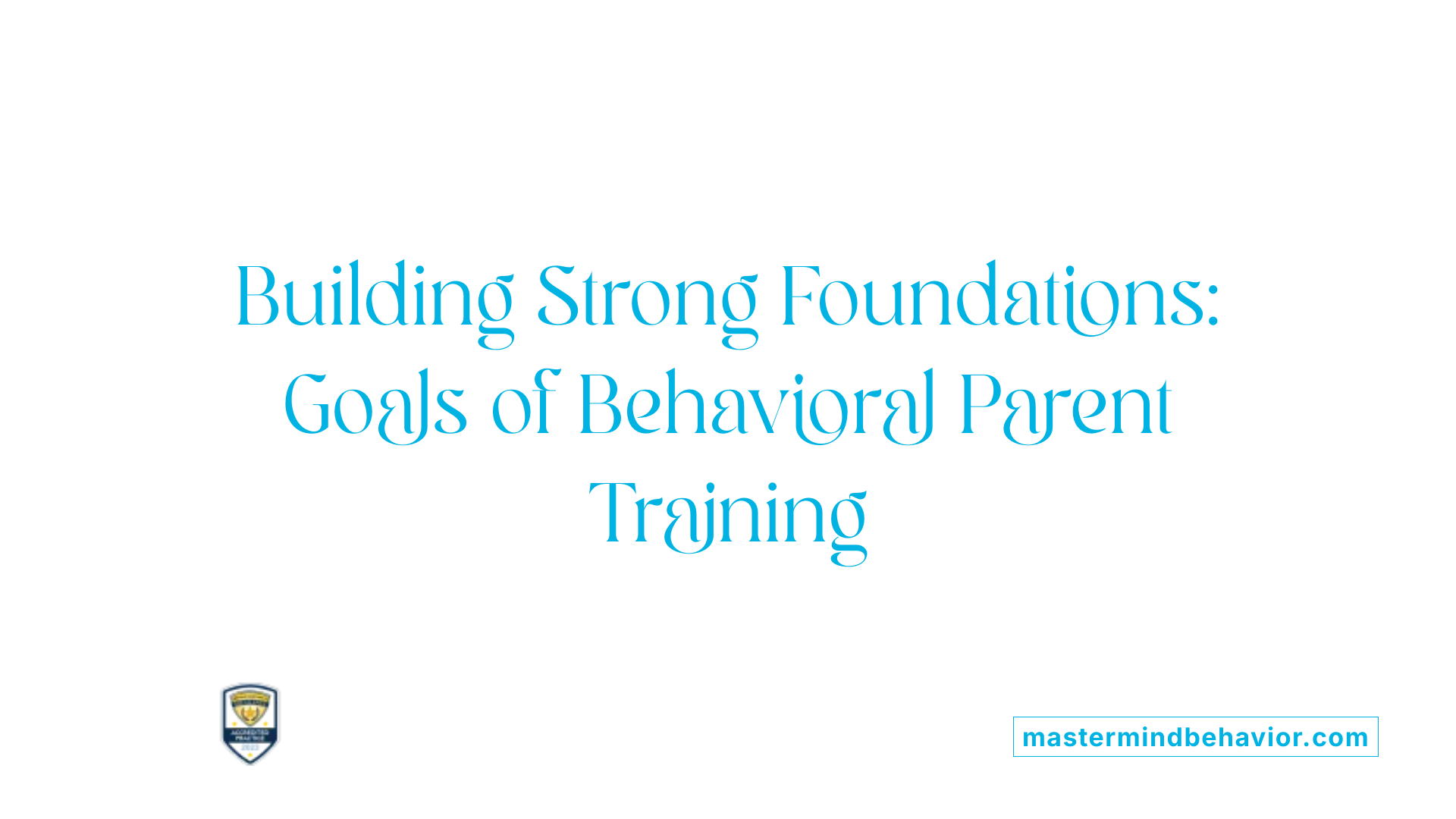
What are the two major goals of behavioral parent training?
The main aims of parent training are to help parents manage their child's disruptive behaviors and strengthen their relationship. These programs focus on teaching parents how to use positive reinforcement and consistent discipline strategies to reduce oppositional, aggressive, and noncompliant behaviors.
One goal is to equip parents with skills such as praise, setting clear limits, and ignoring minor misbehaviors. These techniques are grounded in principles of operant conditioning and applied behavioral analysis (ABA), designed to encourage desirable behaviors.
The second goal is to improve overall family functioning. By fostering better communication and creating structured environments, parents can support their child's emotional regulation and learning.
Additionally, parent training aims to promote positive development by encouraging predictability and routine, which helps children feel secure and understood.
Through these strategies, families benefit from healthier interactions and children experience long-term behavioral improvements. The ultimate objective is empowering parents with practical, evidence-based skills to create supportive, nurturing homes.
Impact of Parental Participation on Treatment Success
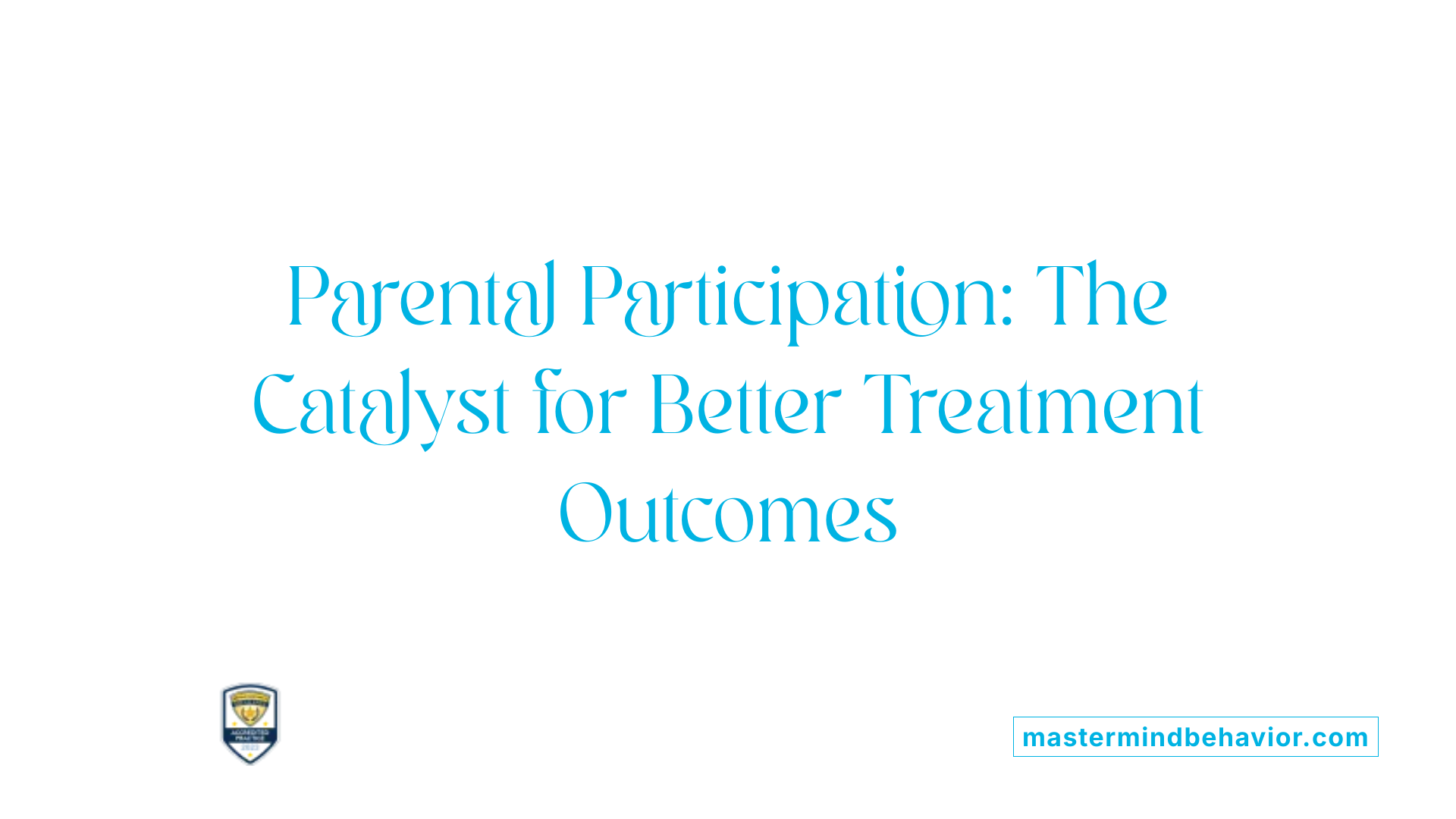
How does parent participation influence treatment outcomes and skill development in ABA?
Parent involvement is crucial in making ABA therapy more effective for children. When parents actively participate, they help ensure that strategies are consistently used at home and in other settings. This consistency fosters better learning and helps children transfer skills learned in therapy to everyday life.
Engaged parents practice techniques like positive reinforcement, prompting, and managing challenging behaviors in real situations. This ongoing practice supports the child's skill retention and generalization, meaning that behaviors learned during therapy are more likely to stick and be used across different environments.
Research shows that higher parent involvement—such as sharing observations, providing feedback, and implementing strategies—leads to improved children’s progress. It also reduces parental stress and builds confidence, strengthening the family bond.
Effective communication between parents and therapists is another important aspect. When parents understand the principles behind ABA, they can work collaboratively with providers, making adjustments as needed. This teamwork enhances treatment success and helps children achieve their developmental goals.
In sum, parental participation acts as a cornerstone for maximizing the long-term benefits of ABA. It supports skill development, ensures consistency, and promotes ongoing growth well beyond formal therapy sessions, leading to more positive outcomes for children and their families.
Strategies and Techniques in Parent Training
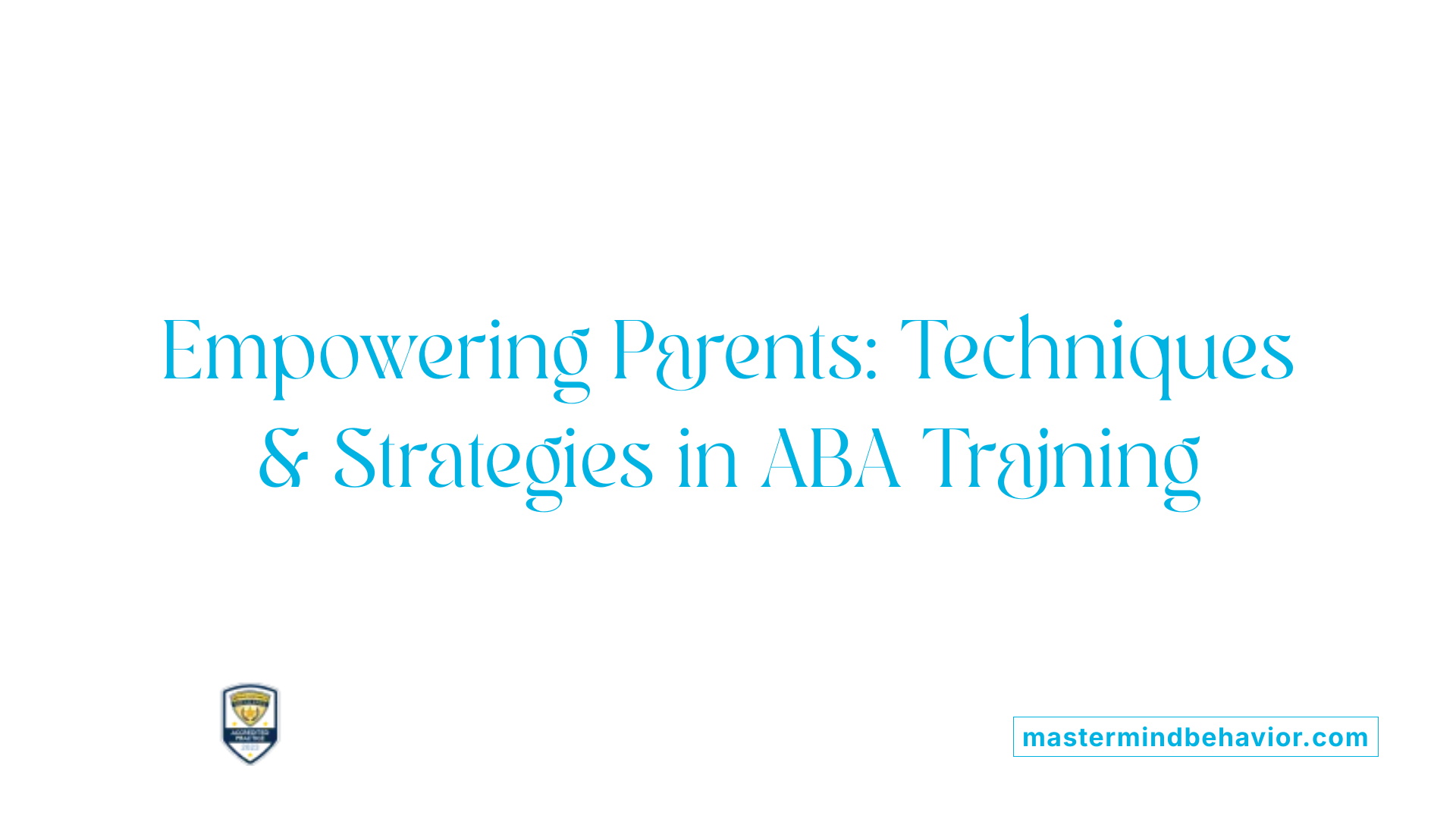
What strategies and techniques are involved in parent training within ABA?
Parent training within ABA encompasses a variety of strategies aimed at empowering parents to support their child's developmental progress effectively. One core component involves teaching behavior management techniques to help parents handle challenging behaviors calmly and consistently. These include strategies like positive reinforcement, which encourages desirable behaviors, and prompting, which provides cues to guide responses.
Effective parent training also focuses on providing hands-on practice through role-playing scenarios. This allows parents to experience real-life situations in a controlled environment, receive immediate feedback, and refine their skills. Modeling is another vital technique where therapists demonstrate specific behaviors or responses for parents to imitate.
Monitoring progress is integral to tailoring intervention plans. Behavior analysts assess family dynamics, define clear, measurable goals, and develop individualized strategies that suit the child's needs and home environment. Continuous data collection and review help adjust approaches to maximize effectiveness.
Moreover, parent training addresses common barriers by building parent confidence and reducing stress, which enhances overall engagement. It supports long-term independence for children by fostering consistency across settings—home, school, and community.
In summary, comprehensive parent training combines systematic steps—assessment, education, hands-on practice, and ongoing support—with foundational principles like reinforcement and prompting. This collaborative approach promotes skill generalization, sustains behavior change, and ultimately improves treatment outcomes for children with ASD and other developmental challenges.
Benefits of Parent Training for Family and Child Well-being
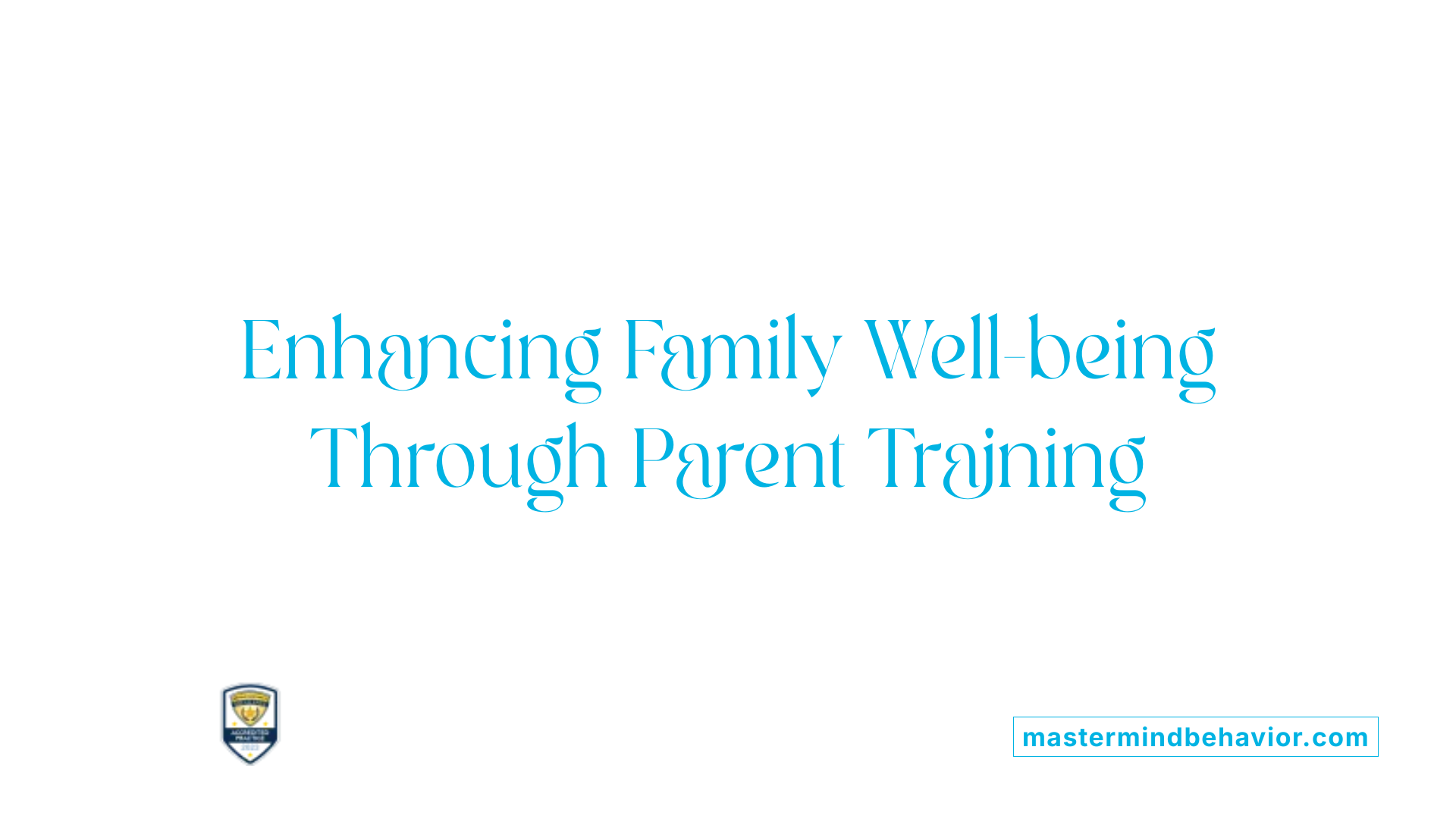
What are the benefits of parent training for child and family well-being?
Parent training plays a crucial role in supporting the overall well-being of both children and their families. It equips parents with effective behavioral strategies rooted in Applied Behavior Analysis (ABA), which helps improve children's social skills and manage challenging behaviors.
Through training, parents learn to communicate more effectively with their children, fostering stronger relationships and creating a more positive home environment. This increased understanding and support help children transfer learned skills to various settings like school and community, promoting consistency and generalization.
An important benefit of parent training is its impact on parental well-being. Participating in these programs reduces parental stress by providing practical tools and strategies to handle difficult behaviors calmly and confidently. Parents often experience greater self-efficacy, feeling more empowered and less overwhelmed.
Studies and evidence-based programs demonstrate that parent training not only benefits the child's development but also enhances family dynamics and mental health. It has been linked to a decrease in instances of child maltreatment, fostering healthier caregiving environments.
Furthermore, engaging parents in training can lead to quicker achievement of therapy goals, better maintenance of skills, and more successful long-term outcomes for children. It also supports early intervention, which is vital in maximizing developmental prospects.
In summary, investing in parent training yields significant advantages by strengthening family bonds, improving child behavior and social capabilities, and promoting a supportive and resilient family environment. It encourages ongoing developmental progress and contributes to healthier communities overall.
A Holistic Approach to Sustainable Development
Incorporating parent training into ABA therapy is not merely supplementary but essential for achieving sustainable, meaningful progress for children with autism and other developmental challenges. By empowering parents with skills, knowledge, and confidence, this collaborative approach enhances the transfer, generalization, and maintenance of behavioral gains, maximizes treatment outcomes, reduces family stress, and fosters a more supportive and engaged family environment. Ultimately, the investment in comprehensive parent training benefits not only the child's development but also strengthens familial bonds and community ties—paving the way for resilient and thriving families.
References
- 8 Reasons to Complete ABA Parent Training
- ABA Parent Training Programs for Children with Autism
- The Role of Parent Training in ABA Intervention - Clinical Behavior
- The Importance of Parent Training in ABA - Compleatkidz
- Effective ABA Parent Training - Brady Behavioral Analysis
- The Crucial Role of Parent Training in ABA: Unlocking Success ...
- The Ultimate Guide to Parent Training in ABA







